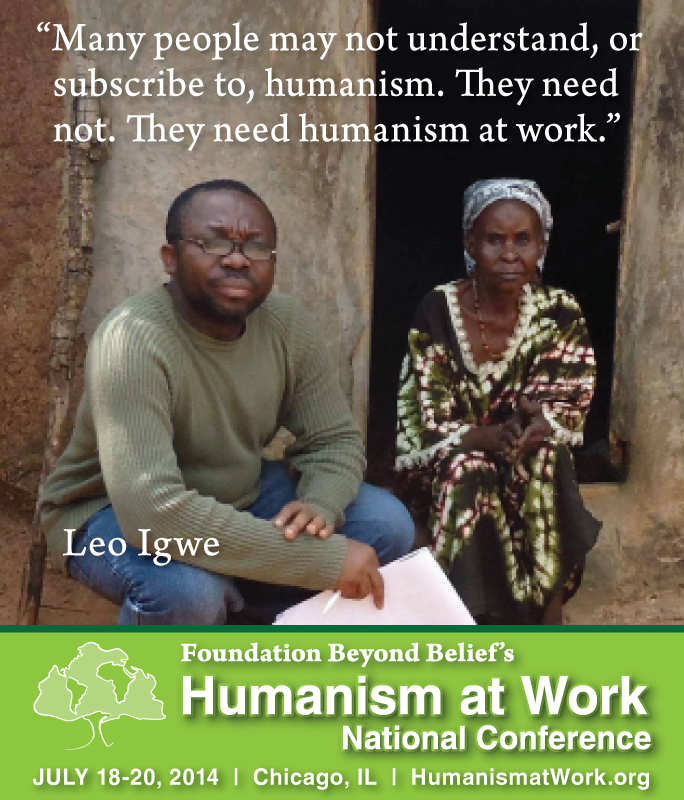
Leo Igwe: Ignore the debate of the heart, and you’ve lost the debate
By AdministratorNigerian humanist Leo Igwe works in Ghana to fight witchcraft accusations and to support and protect the accused. His project has twice been the recipient of a small grant from Foundation Beyond Belief (in 2012 and 2014), and Pathfinders Project worked with Leo at the Kukuo witch camp last December. Leo will be speaking at the Humanism at Work conference about the situation of witchcraft accusations and how humanism can make a difference in supporting victims, dialoguing with accusers, and slowly dismantling and reorienting witchcraft accusation structures in Ghana and the rest of Africa.
Leo Igwe Skypes me from an Internet café in Ghana. Behind him, the café buzzes with activity, and more than one curious glance is thrown my way. Leo will soon be leaving for rural Ghana to continue his campaign helping people victimized by accusations of witchcraft, but he has cleared a brief window to tell me about his work, alternating between making me laugh uproariously and leaving me in awe of his tenacity and bravery.
“I work in Ghana to preserve my neutrality,” he tells me. Leo is from Nigeria, having been born in a rural village shortly after the end of the Nigerian Civil War – “not even in a hospital” – but his activism caused him to fall foul of the Nigerian authorities, which led to horrifying attacks on himself and his family. “In Ghana I have no track record of activism, so I can easily walk into an office and get answers,” he says.
Leo grew up listening to his parents talking about the potency of the occult, and hearing neighbors make accusations of evil magic. “I was brought up in a community and country where there was – and still is – so much belief in witchcraft,” he says. “I saw firsthand the damage irrational beliefs can do: torture and killing of people suspected of using evil magic. As a child I was made to believe that witchcraft was a fact, but realizing while growing up that it was superstition was liberating.”
Growing up was difficult, says Leo, and he was driven to read about people who had fought for something bigger than themselves. He was inspired by the likes of Bertrand Russell, Nicolas Walter, Paul Kurtz, and Nelson Mandela. “I wasn’t contented with this narrow vision of fighting for yourself, for your family, for your race; we must fight for something bigger,” he says. “I’m not saying that I want to change the whole world, but I am saying that I want to do something.”
Although his work is sometimes dangerous and always heartbreaking, Leo has achieved so many remarkable successes in his career, such as the rescue of Esther, an 8-year-old Nigerian girl accused of witchcraft and kidnapped by a 40-year-old man. After storming the man’s house, Igwe and his team rescued Esther, who is now in a safe private care center. “I felt so good as we led Esther away into safety and humanity,” he says. “I always have this notion that the darkest part of the night is followed by the dawn. Things cannot keep getting worse and worse. I always look forward to a new tide and a new turn of events.”
One of the most important things he wants to convey about his work is that “it is our work, not my work. The global humanist community needs to realize that there are so many poor, uneducated folks out there who are victimized by religious and superstitious extremists and who yearn for care and compassion that flow from reason and critical thinking. Many of these people may not understand, or subscribe to, humanism. They need not. They need humanism at work.”
Any and all contributions to his work help, he adds: “I had no money when I started; I didn’t know how to write articles; and all of a sudden today, I have friends, supporters, all around the world. Anybody who connects with what I’m doing, do what you can. You may not have money, but you have time, you have a website; you can write an article and put it on your blog, you can write a letter to the editor, talk to somebody, lobby – do whatever little thing you think you can do to support my work. You know the best thing you can do. It’s those little bits, that’s how we’re going to build it.”
Leo sees his campaigns to alleviate the impact of witchcraft accusations as an effective way of promoting humanism – not to convert theists, but to put humanism to work for humanity: “I believe there is a sense of compassion that those who do not believe in god or witches have, or can express, by virtue of their disbelief. Putting this sense of compassion at humanity’s disposal is enriching humanity. It should not be misconstrued to be an atheist conversion campaign; it is humanism at its best.” His campaign puts humanism to work for people most affected by superstition and religious fanaticism. “Humanism cannot thrive in a society ravaged by superstition and religious extremism,” he explains.
Showing compassion as a community is the most important next step for humanism, says Igwe. “We won the debate of the mind long ago, but there’s another debate, the debate of the heart: We think that winning the debate of the mind is enough, but it’s not. When you ignore the debate of the heart, and just work on the debate of the mind, you’ve lost the debate.”
“People want to see us at work. That is the gap.”
To see Leo Igwe and the rest of our fantastic slate of speakers, register now for the Humanism at Work conference, July 18-20 in Chicago.
